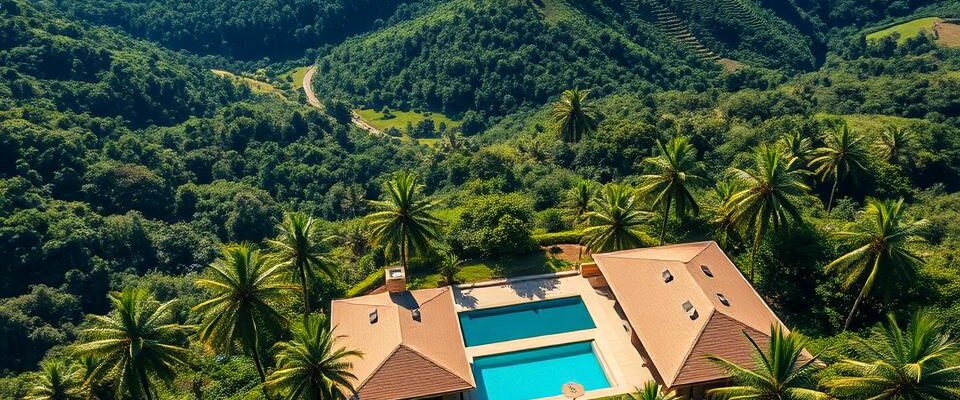Costa Rica Property: Owner Financing vs Traditional Financing
The residential real estate market in Costa Rica is experiencing a surge in demand from international buyers, with projections indicating a growth rate of 3.88% annually from 2024 to 2029. As a foreign buyer, securing financing can be challenging due to the unique characteristics of Costa Rica’s market.
At Gap Real Estate, we’ve guided numerous clients through the process, offering expert guidance and clear communication. We understand that navigating financing options is crucial for a successful transaction. In this article, we’ll explore the landscape of financing available for purchasing property in Costa Rica, comparing owner financing with traditional bank financing to help you make an informed decision.
Understanding the Costa Rica Real Estate Market
The Costa Rica real estate market is experiencing a significant surge in international interest, driven by its unique blend of natural beauty and political stability. At Gap Real Estate, we offer deep local knowledge with 20+ years of insight into Costa Rica’s market, enabling us to provide valuable guidance to foreign investors.
Current Market Trends and Opportunities
Current market trends show increasing demand in coastal areas and mountain regions, with particular growth in sustainable and eco-friendly developments. The residential real estate market in Costa Rica is projected to grow at an annual rate of 3.88% from 2024 to 2029, reaching over $334 billion USD.Our experience across Costa Rica allows us to observe how different regions develop, providing insights into emerging opportunities and established markets.
Why Foreigners Are Investing in Costa Rica Property
Foreign investors are drawn to Costa Rica for various reasons, including retirement planning, vacation homes, and rental income potential. The country’s reputation as a stable democracy with no standing army, coupled with its legal framework that allows foreigners to own property with the same rights as citizens, makes it an attractive destination. Investment opportunities range from turnkey vacation rentals to undeveloped land, each with different financing considerations and return potential.
The Financing Challenge for Foreign Buyers
Foreign buyers often encounter significant hurdles when attempting to secure traditional financing for property purchases in Costa Rica. The country’s banking system is designed to favor residents and citizens, making it difficult for non-residents to navigate the financing process.
Banking Restrictions for Non-Residents
Costa Rican banks impose strict regulations on non-resident applicants, reflecting the perceived higher risk. As a result, foreign buyers face stricter lending criteria, higher interest rates, and larger down payment requirements compared to Costa Rican citizens. These restrictions can be challenging for foreign buyers to overcome, often leading to frustration and a search for alternative financing options.

Documentation Requirements for Foreigners
The documentation required for foreign buyers to secure financing in Costa Rica is extensive. Typically, banks require bank statements from the last 6-12 months, tax returns from the past 2-3 years, proof of income, credit reports, valid passports, and proof of address, all of which may need to be translated into Spanish and authenticated. This complex documentation process can significantly delay the approval process, often taking months rather than weeks.
Understanding these challenges upfront is crucial for foreign buyers to develop realistic financing strategies and avoid delays in their property purchase timeline. While these restrictions may seem daunting, they have contributed to Costa Rica’s stable banking system, with not a single bank failure in the country’s history.
Traditional Bank Financing in Costa Rica
For those looking to invest in Costa Rican property, traditional bank financing presents a viable, albeit challenging, pathway. This financing method is particularly appealing for its potential to offer long-term stability through structured loan terms.
Qualification Requirements and Process
The qualification requirements for traditional bank financing in Costa Rica are stringent, particularly for foreign investors. Applicants must demonstrate a stable income, maintain an excellent credit history, and possess substantial assets. The application process is comprehensive, involving property appraisal, title verification, credit checks, and a thorough review of documentation.
Interest Rates and Terms
Interest rates for traditional bank financing in Costa Rica typically range from 8.5% to 10%. The loan terms can extend up to 30 years, providing buyers with a manageable repayment schedule. However, foreign borrowers may face higher interest rates due to the perceived risk.
Advantages and Disadvantages
Traditional bank financing offers several advantages, including longer repayment terms and potentially lower interest rates compared to alternative financing methods. It also provides the security of dealing with established financial institutions. However, the significant disadvantages include high down payment requirements, extensive documentation needs, and a lengthy approval process that can delay property acquisition.
Additional costs associated with traditional bank financing include closing fees, life insurance requirements, and property insurance. Despite these challenges, traditional bank financing remains a preferred option for buyers who plan to hold the property long-term and can meet the stringent qualification requirements.
Owner Financing vs Traditional Financing in Costa Rica
In Costa Rica, prospective property buyers can opt for either owner financing or traditional bank financing, both of which have their advantages and disadvantages. Owner financing emerges as a direct path to property ownership and is one of the most favorable methods to obtain a property with financing. This financing method sidesteps banking obstacles, fostering a personalized agreement between the buyer and seller.
Key Differences in Structure and Terms
The structure and terms of owner financing and traditional financing differ significantly. Owner financing creates a direct relationship between buyer and seller, eliminating the bank as an intermediary and allowing for more flexible, negotiable terms. In contrast, traditional financing typically offers longer terms, up to 30 years, compared to owner financing, which usually ranges from 3-5 years with a balloon payment at the end. The down payment requirements also vary, with traditional financing requiring 30-50% down for foreigners, while owner financing typically starts at 50% but is negotiable.
- Owner financing allows for more flexible payment structures, including interest-only payments and customized payment schedules.
- Traditional financing involves stricter qualification requirements and a longer approval process.
- The approval timeline for owner financing is typically shorter, often closing in weeks rather than months.
Comparing Costs and Interest Rates
When comparing costs and interest rates, owner financing in Costa Rica typically ranges from 6-9%, potentially lower than traditional bank rates of 8.5-10%. However, the shorter repayment period of owner financing can offset this advantage. Additionally, owner financing may not require certain costs associated with traditional financing, such as life insurance and property insurance.

How Owner Financing Works in Costa Rica
In Costa Rica, owner financing allows buyers to acquire property with more flexibility. This financing method is particularly beneficial for foreign buyers who may face challenges with traditional bank financing.
Typical Down Payment Requirements
The typical down payment for owner financing in Costa Rica is around 50% of the property’s value. However, this can be negotiated based on the seller’s comfort level and the buyer’s financial situation.
Repayment Terms and Structures
Repayment terms for owner financing generally range from 3 to 5 years. The structures can vary to accommodate different financial circumstances, providing flexibility for both parties.
Legal Protections for Both Parties
Legal protections in Costa Rica are robust, with formal contracts and property liens in place. The buyer receives the property title, while the seller maintains a registered mortgage or legal trust until full payment is made.
Owner financing in Costa Rica operates as a direct agreement between the seller and buyer, with the seller acting as the bank. This method provides a secure transaction when properly structured, with clear remedies for default.
Common Owner Financing Payment Structures
In Costa Rica, owner financing provides flexibility through various payment plans that can be negotiated between the buyer and seller. This flexibility is one of the key advantages of owner financing, allowing both parties to tailor the agreement to their financial needs and capabilities.
Fixed-Rate Payment Plans
Fixed-rate payment plans establish consistent monthly payments throughout the loan term, combining principal and interest in an amortized schedule. This predictability benefits both parties, as buyers know exactly how much they need to pay each month, and sellers can rely on a steady income stream.
Balloon Payment Options
Balloon payment options allow buyers to make smaller regular payments with a large final payment at the end of the term. While this can make monthly payments more manageable, it requires significant capital or refinancing at the end of the term.
Interest-Only Payments
Interest-only payment structures require buyers to pay only the interest portion during the loan term, with the principal due as a lump sum at the end. This reduces monthly obligations but doesn’t build equity until the final payment.
Customized Payment Schedules
Customized payment schedules are a key feature of owner financing, allowing for seasonal payments, graduated payment structures, or other arrangements that align with the buyer’s income patterns. This flexibility can be particularly beneficial for buyers with irregular income streams.
Each payment structure has different implications for both buyer and seller, affecting cash flow, tax considerations, and the overall cost of the property. Buyers and sellers should carefully consider these factors when negotiating the terms of the owner financing agreement.
- Fixed-rate plans offer predictability.
- Balloon payments require significant capital at the end.
- Interest-only payments reduce monthly obligations.
- Customized schedules offer flexibility.
Alternative Financing Options for Costa Rica Property
When it comes to financing a property in Costa Rica, buyers have several options beyond traditional bank loans. These alternatives can provide more flexibility and opportunities for foreign investors.
Self-Directed IRAs for Property Purchase
Self-directed IRAs allow buyers to use their retirement funds to purchase investment property in Costa Rica. This method comes with strict regulations, requiring the property to be used solely as an investment and all rental income to be returned to the IRA.
Equity Lines of Credit from Home Country
Equity lines of credit (HELOCs) enable buyers to leverage the equity in their home country’s property. This option often provides lower interest rates compared to Costa Rican mortgages and simpler qualification processes based on the buyer’s domestic financial profile.
Developer Financing Opportunities
Developer financing is available for buyers of new construction projects in Costa Rica. This financing method works similarly to owner financing but is offered by the developer, typically with short-term loans, high interest rates, and significant down payments.
International Lenders Specializing in Costa Rica
International lenders that specialize in Costa Rica property financing have emerged to cater to foreign buyers. These lenders offer more accessible qualification requirements than local banks but often charge higher interest rates to mitigate the perceived risk.
Each of these alternative financing options carries different implications for property ownership, tax considerations, and long-term financial planning. Buyers must carefully evaluate these factors to choose the most suitable financing method for their Costa Rica property investment.
Due Diligence for Property Financing in Costa Rica
Due diligence is a critical step in the property financing process in Costa Rica that buyers should not overlook. It involves a comprehensive review of the property to identify potential issues that could affect its value or the financing terms.

Essential Property Checks Before Financing
Before finalizing financing arrangements, buyers should conduct thorough property checks. This includes verifying legal water rights, conducting boundary surveys, obtaining land use permits (Uso de Suelo), and ensuring all structures have proper building permits.
- Verify legal water rights and access to municipal water or proper water concessions.
- Conduct boundary surveys to confirm property lines.
- Obtain land use permits (Uso de Suelo) to ensure compliance with local regulations.
- Verify that all structures have proper building permits.
Legal Considerations and Protections
Legal considerations extend beyond the property itself to the financing structure. For owner financing, proper documentation of the lien or mortgage is crucial for protecting both parties. Buyers should work with qualified professionals, including a real estate attorney, licensed surveyor (topographer), and property inspector, to ensure a smooth due diligence process.
- Verify title through the National Registry (Registro Nacional) to confirm ownership and check for encumbrances.
- Ensure compliance with environmental regulations, particularly in coastal zones or protected areas.
- Check for building code compliance and permit verification for existing structures.
Practical Tips for Negotiating Financing Terms
Effective negotiation of financing terms is vital for both buyers and sellers in Costa Rica. Every aspect of owner financing is negotiable, from interest rates to payment terms, allowing for flexible agreements that can benefit both parties.
For Buyers: Getting the Best Terms
Buyers can secure favorable financing terms by being prepared with alternative options and demonstrating financial stability. Understanding the seller’s timeline and financial needs can help structure offers that meet both parties’ priorities. This approach enables buyers to negotiate better interest rates and payment terms.
For Sellers: Protecting Your Investment
Sellers can protect their investment by thoroughly screening buyers, including credit checks and verifying financial capacity. Structuring appropriate down payments and including legal protections in the financing agreement can ensure a secure transaction. Professional assistance during negotiations can also suggest creative solutions that protect both parties’ interests.
Conclusion: Making the Right Financing Choice for Your Costa Rica Property
Understanding the nuances of financing options in Costa Rica is key to successful property investment. We help you navigate between owner financing and traditional bank financing, considering factors like interest rates, terms, and personal financial situations. With over two decades of experience, Gap Real Estate guides you through the process, ensuring a seamless transaction. Whether you opt for owner financing or traditional bank loans, thorough due diligence is essential. The right financing choice creates a sustainable financial structure, supporting your enjoyment of Costa Rica’s natural beauty and vibrant culture.




